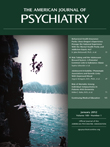Religiosity and Major Depression in Adults at High Risk: A Ten-Year Prospective Study
Abstract
Objective:
Previously the authors found that personal importance of religion or spirituality was associated with a lower risk for major depression in a study of adults with and without a history of depression. Here the authors examine the association of personal importance of religion or spirituality with major depression in the adult offspring of the original sample using a 10-year prospective longitudinal design.
Method:
Participants were 114 adult offspring of depressed and nondepressed parents, followed longitudinally. The analysis covers the period from the 10-year to the 20-year follow-up assessments. Diagnosis was assessed with the Schedule for Affective Disorders and Schizophrenia–Lifetime Version. Religiosity measures included personal importance of religion or spirituality, frequency of attendance at religious services, and denomination (all participants were Catholic or Protestant). In a logistic regression analysis, major depression at 20 years was used as the outcome measure and the three religiosity variables at 10 years as predictors.
Results:
Offspring who reported at year 10 that religion or spirituality was highly important to them had about one-fourth the risk of experiencing major depression between years 10 and 20 compared with other participants. Religious attendance and denomination did not significantly predict this outcome. The effect was most pronounced among offspring at high risk for depression by virtue of having a depressed parent; in this group, those who reported a high importance of religion or spirituality had about one-tenth the risk of experiencing major depression between years 10 and 20 compared with those who did not. The protective effect was found primarily against recurrence rather than onset of depression.
Conclusions:
A high self-report rating of the importance of religion or spirituality may have a protective effect against recurrence of depression, particularly in adults with a history of parental depression.



